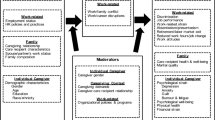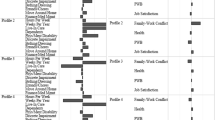Abstract
The current study investigated the effects of balancing elder care and work on emotional health. Responses from 43 retired caregivers, 211 not retired caregivers, 49 retired non-caregivers, and 224 not retired non-caregivers, who had participated in the national Health and Retirement Study, served as the data base. Results indicate that Caregiver Status (Caregiver vs. Non-caregiver) and Retirement Status (Retired vs. Not Retired) interact, depending on the measure of emotional health. The relationship between the number of depression symptoms reported and Caregiver Status depended on whether the respondent was also retired or employed; a significant interaction was not found when emotional health was measured with one overall item. A significant difference was not found between employed caregivers and employed non-caregivers, in terms of emotional health. Employed caregivers who gave more caregiving hours did report poorer emotional health than employed caregivers who gave fewer hours. Female caregivers reported more depression symptoms than male caregivers. The results suggest that employers may need to develop interventions which may help caregivers who are highly involved with caregiving responsibilities.
Similar content being viewed by others
REFERENCES
Barling, J., MacEwen, K. E., Kelloway, E. K., & Higginbottom, S. F. (1994). Predictors and outcomes of elder-care-based interrole conflict. Psychology and Aging, 9 (3), 391–397.
Baruch, G. K., Biener, L., & Barnett, R. C. (1987). Women and gender in research on work and family stress. American Psychologist, 42, 130–136.
Braithwaite, V. (1992). Caregiving burden: Making the concept scientifically useful and relevant. Research on Aging, 14 (1), 3–27.
Cooke, R. A., & Rousseau, D. M. (1984). Stress and strain from family roles and work-role expectations. Journal of Applied Psychology, 69, 252–260.
Gottlieb, B. H., Kelloway, E. K., & Fraboni, M. (1994). Aspects of eldercare that place employees at risk. The Gerontologist, 34 (6), 815–821.
Gustman, A. L., Mitchell, O. S., & Steinmeier, T. L. (1995). Retirement measures in the Health and Retirement Study. The Journal of Human Resources, 30 (Supplement), S57-S83.
Kohout, F. Berkman, L. F., Evans, D. A., & Cornoni-Huntley, J. (1993). Two short forms of the CES-D depression symptoms index. Journal of Aging and Health, 5, 179–193.
Kossek, E. E., & Ozeki, C. (1998). Work-family conflict, policies, and the job-life satisfaction relationship: A review and directions for organizational behavior-human resources research. Journal of Applied Psychology, 83, 139–149.
Kramer, B. J., & Kipnis, S. (1995). Eldercare and work-role conflict: Toward an understanding of gender differences in caregiver burden. The Gerontologist, 35, 340–348.
Lee, J. A. (1997). Balancing elder care responsibilities and work: Two empirical studies. Journal of Occupational Health Psychology, 2, 220–228.
Levine, P. B. (1993). Examining labor force projections for the twenty-first century. In O. S. Mitchell (Ed.), As the workforce ages (pp. 38–56). Ithaca, New York: ILR Press.
McGarry, K., & Schoeni, R. F. (1995). Transfer behavior in the Health and Retirement Study. The Journal of Human Resources, 30 (Supplement), S184-S226.
Moon, M., & Juster, F. T. (1995). Economic status measures in the Health and Retirement Study. The Journal of Human Resources, 30 (Supplement), S138-S157.
Neal, M. B., Chapman, N. J., Ingersoll-Dayton, B., & Emlen, A. C. (1993). Balancing work and caregiving for children, adults, and elders. Newbury Park, CA: Sage Publications Inc.
Panek, P. E. (1997). The older worker. In A. D. Fiske & Rogers W. A. (Eds.), Handbook of human factors and the older adult (pp. 363–394). New York: Academic Press.
Scharlach, A. E., Runkle, M. C., Midanik, L. T., & Soghikian, K. (1994). Health conditions and service utilization of adults with elder care responsibilities. Journal of Aging and Health, 6, 336–352.
Sheppard, H. L. (1988). Work continuity versus retirement: Reasons for continuing work. In R. Morris & S. A. Bass (Eds.), Retirement reconsidered (pp. 129–147). New York: Springer.
Sizemore, M. T., & Jones, A. B. (1990). Eldercare and the workplace: Short-term training preferences of employees. Educational Gerontology, 16, 97–104.
Soldo, B. J., & Hill, M. S. (1995). Family structure and transfer measures in the Health and Retirement Study: Background and overview. The Journal of Human Resources, 30 (Supplement), S108-S137.
Thoits, P. A. (1983). Multiple identities and psychological well-being: A reformulation and test of the social isolation hypothesis. American Sociological Review, 48, 174–187.
Tully, C. T., & Sehm, S. D. (1994). Eldercare: The social service system's missing link? Journal of Gerontological Social Work, 2(3/4), 117–132.
Wagner, D. L., & Hunt, G. G. (1994). The use of workplace elder care programs by employed caregivers. Research on Aging, 16(1), 69–84.
Wallace, R. B., & Herzog, A. R. (1995). Overview of the health measures in the Health and Retirement Study. The Journal of Human Resources, 30 (Supplement), S84-S107.
Author information
Authors and Affiliations
Rights and permissions
About this article
Cite this article
Lee, J.A., Walker, M. & Shoup, R. Balancing Elder Care Responsibilities and Work: The Impact on Emotional Health. Journal of Business and Psychology 16, 277–289 (2001). https://doi.org/10.1023/A:1011165318139
Issue Date:
DOI: https://doi.org/10.1023/A:1011165318139




